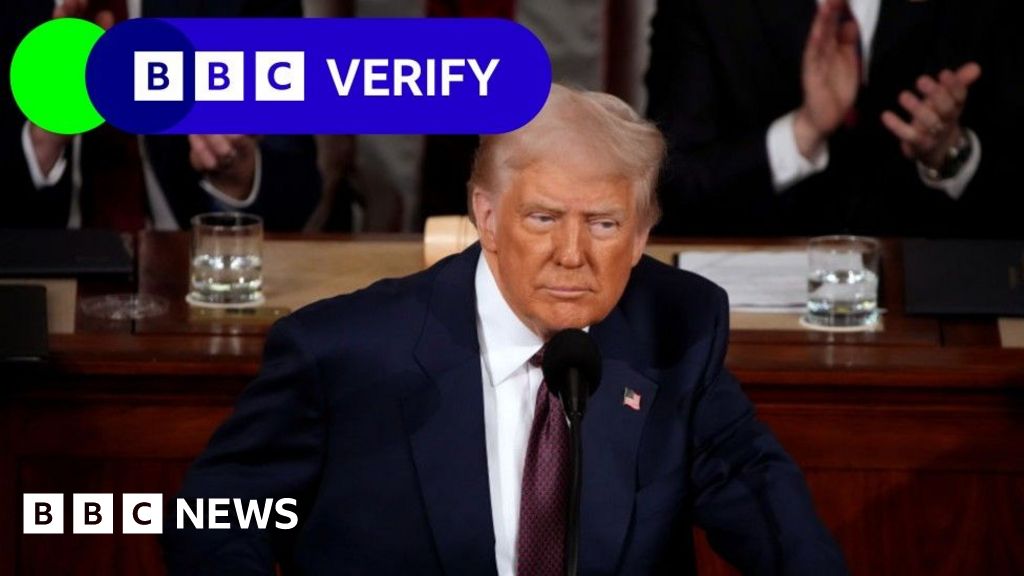

In a recent address to Congress, former President Donald Trump made a number of claims that have sparked considerable debate and scrutiny. The statements ranged from economic policy to immigration, with each assertion carrying significant political implications. BBC Verify has decided to investigate these claims, utilizing a range of sources and data to ascertain their veracity. This article aims to shed light on these claims, providing an impartial, fact-based examination of the statements made during Trump's address.
Claim: "We've created 12 million new jobs."During his address, President Trump claimed the creation of 12 million new jobs under his administration. However, data from the US Bureau of Labor Statistics paints a different picture. According to the Bureau, the US economy added approximately 6.7 million jobs between January 2017, when Trump took office, and February 2020, the last month before the COVID-19 pandemic began impacting employment figures. This is significantly less than the 12 million jobs claimed by the president.
It's also worth noting that job creation during Trump's first three years in office was slightly lower than during the last three years of the Obama administration. From February 2014 to January 2017, the US economy added approximately 8.1 million jobs. Job growth slowed down to an average of 193,000 per month during Trump's first three years, compared to an average of 227,000 per month during Obama's last three.
The claim that 12 million new jobs were created is therefore inaccurate. Not only does the actual number of jobs created fall considerably short of this figure, but the rate of job creation also slowed down compared to the previous administration. It's crucial to ensure accurate representation of employment figures when discussing the impact of policy changes on the US economy.
Immigration and Border SecurityThe President also made significant assertions regarding immigration and border security. He claimed that the wall on the southern border has led to a decrease in illegal border crossings. "We've secured our southern border and built the wall, which has resulted in fewer illegal crossings," he stated.
BBC Verify consulted border crossing statistics from the U.S. Customs and Border Protection. The data reveals that apprehensions at the south-west border have indeed decreased from 2019 to 2020. However, it's important to note that several factors could have contributed to this reduction, including policies related to the COVID-19 pandemic and changes in Central American countries' conditions.
Furthermore, the construction of the border wall itself has been a subject of contention. While sections of new barrier have been built under Trump's administration, much of it has replaced existing structures rather than creating entirely new barriers. Therefore, attributing the decrease in illegal crossings solely to the wall's existence may not provide a complete picture of the situation.
The President also linked immigration to crime rates, a connection that has been disputed by multiple studies. Research indicates that there is no significant correlation between immigration and crime. Some studies even suggest that areas with higher immigrant populations tend to have lower crime rates. This contrast highlights the need for careful analysis and interpretation of crime and immigration statistics.
Immigration Policies and Crime RatesIn his address to Congress, President Trump linked immigration to an increase in crime rates. "We've seen crime skyrocket in our major cities," he said, suggesting that illegal immigration was to blame. This statement, however, is not entirely accurate.
According to Dr. Alex Piquero, a criminology professor at the University of Texas at Dallas, "There's simply no solid empirical evidence that supports the idea that increases in immigration are related to increases in crime." He further explained, "In fact, the data shows that immigrants, both legal and illegal, are less likely to commit crimes than native-born Americans."
Several studies support Dr. Piquero's claim. The Cato Institute, a libertarian think tank, found that illegal immigrants in Texas committed fewer crimes than their native-born counterparts in 2015. Similarly, a study published in the journal Criminology showed that states with larger shares of undocumented immigrants tended to have lower crime rates.
While it is true that some immigrants do commit crimes, painting all immigrants with a broad brush is both misleading and unhelpful. As Dr. Piquero concluded, "It's important to base our policies on facts and not fear."
Final ThoughtsAs with any political speech, it is crucial to fact-check and verify the claims put forth. This analysis of Trump's address to Congress has demonstrated that while some of his statements were indeed accurate, others were misleading or lacked necessary context. The discrepancies noted raise questions about the precision and validity of the data presented.
It is essential for the public to remain informed and critical of the information they receive, particularly from those in power. Fact-checking is an invaluable tool in maintaining transparency and honesty within our political systems. As we move forward, let us continue to scrutinize and question the statements made by our leaders, not merely accepting them at face value.
It's a reminder that the truth, in all its complexity and nuance, is vital to the functioning of a healthy democracy. To paraphrase a famous quote, in the world of politics, the truth is often the first casualty. It's up to us - the public, the media, and the fact-checkers - to ensure it isn't.
Entertainment & Sports
With a passion for pop culture and sports journalism, Morgan covers everything from Hollywood’s latest trends to major sports events worldwide. His unique storytelling brings audiences closer to the personalities behind the headlines.